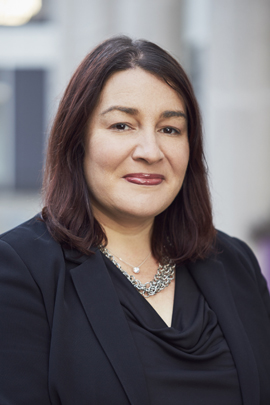The chief executive of the Security Industry Authority (SIA) Michelle Russell, pictured, who spoke in public most recently at the UK OSPAs thought leadership summit, is showing herself to be sure-footed, writes Mark Rowe.
She spoke online at a Security Institute webinar while still interim CEO, having taken over in the autumn of 2020 from Ian Todd, who left after a year and a half for another regulator, the Independent Parliamentary Standards Authority. She became CEO properly in November, the month she spoke at the SIA’s annual conference, also held online. And at Lancaster Gate in London last Thursday she was among the speakers at the UK OSPAs afternoon event, before the evening awards.
Some things she has spoken of consistently; some things that evidently she – like any CEO – wants to make her own; and some that reflect the SIA’s position. She is, to quote her from the OSPAs afternoon, ‘very conscious’ of individual security officers; and of the £190 cost of applying for the three-year licence, a cost she described as ‘significant’. In November, she spoke after the attempted presumed suicide bombing outside a hospital in Liverpool, when (as so often at such incidents) security staff rose to the occasion. Then it was easy to pay tribute to the front line officer that wears the SIA badge; but otherwise, it is easy to take them for granted. Again, it is easy to take as read the task of the SIA, to issue licences and renewals to hundreds of thousands of people. Michelle Russell has not done that. She spoke to the OSPAs of ‘more improvements to the core licensing systems’.
She is also consistent in setting out where she wants to take the organisation. Again, that is a stock in trade for any CEO; but she also goes to some lengths to set out what the SIA cannot do. That presumably will leave some unpleased. She concluded at the OSPAs by saying: “I won’t shy away from having difficult conversations.”
It may be a strange CEO who confronts what their organisation cannot or will not do. There however Michelle Russell has unerringly identified the key truth about the SIA – which by being unacknowledged (or even unnoticed) by past chiefs and SIA staffers only leads to anger all round, and can explain why the SIA can appear to be stand-offish towards the industry that it serves, and that pays its wages. The SIA has two other masters: the Home Office; and the public. Like the BBC, the SIA cannot possibly satisfy all.
Hence a repeated phrase in her speech to the OSPAs was ‘nudging, and assisting and influencing’ or some combination of those words. The SIA can support the industry, for example, to set up a skills board – due to happen any time now; as discussed at a summit convened by the SIA in March 2020 on the eve of the first pandemic lockdown, which understandably put a brake on the ‘skills agenda’ being developed. Then as now, the SIA can play a part in the industry working out its related skills issues – how to map out what training courses are needed to equip people for jobs beyond the SIA basic licence, and how to accredit trainers to teach those courses, and how the qualifications fit into a ‘career pathway’ that the young and talented can see and readily follow. But it is for the industry to decide (and find the money).
She framed diversity in terms of what the SIA can and cannot do. The SIA has its own responsibility on equality, diversity and inclusion (EDI); and it’s important, she said, for the SIA’s teams to reflect the diversity of the customers that they service. Hence the SIA’s backing, and her personal appearance, at Professional Security magazine’s Women in Security awards night in September 2021 (and the SIA is among the judging panel); and an awareness campaign by the regulator on the risks to women and girls, notably in the night-time economy when going out.
Likewise with the approved contractor scheme (ACS). It’s one of those things that the regulator has to do; and only it can do, under the Private Security Industry Act 2001 that set the SIA up. But, ACS matters to more than the 850 or so approved companies; and buyers of their services (including the state, through guarding contracts for courts, central government department buildings, and so on). ACS also affects every shopper of a mall where ACS officers patrol; and every employee of a factory where an ACS firm has officers in the gatehouse and its signage on the perimeter fence. Hence Michelle Russell spoke to her industry audience of ‘nudging and influencing and working with you’ on the ACS, which is at once a ‘quality scheme’ and something that a guarding company (typically) has to comply with.
To further complicate matters – but also making ‘difficult conversations’ between all interest groups imperative – public expectations and needs, as Michelle Russell said, keep changing.
More in the April print edition of Professional Security magazine.










